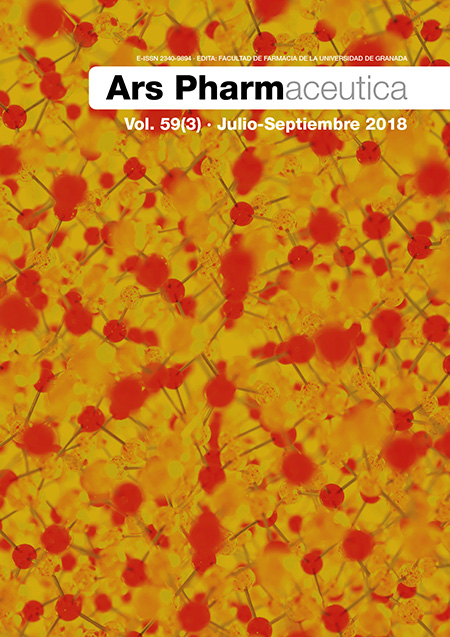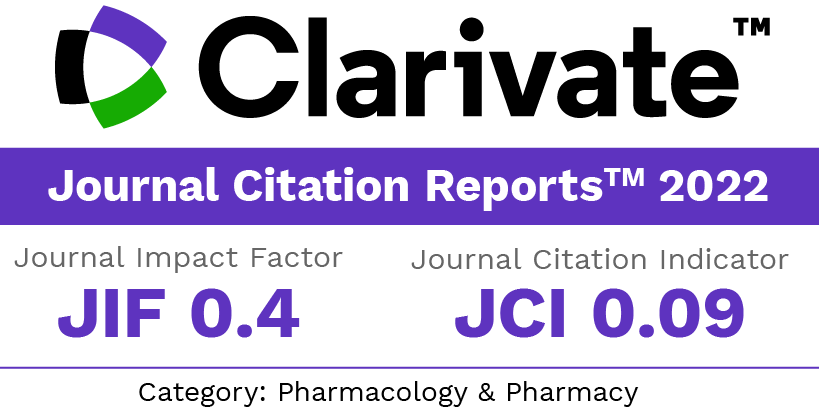Multidisciplinary team of critically ill patient care: What is the contribution of the pharmacist?
Keywords:
Pharmacists, intensive care units, patient care team, critical care, critical illnessAbstract
Background and objective: The severity and instability of the patients, together with the high degree of complexity of the medication, make the intensive care units (ICU) a critical area of problems related to medication. The aim of our study was to analyze and assess the activity performed by the clinical pharmacist integrated in an ICU and to know the opinion of the staff about it.
Material and method: A 42 month descriptive and prospective study was conducted. The pharmacist was integrated into the daily activity of the multidisciplinary team of a 12-bed ICU belonging to the Anaesthesiology and Resuscitation Department. Every pharmacotherapeutic intervention (PI) carried out, the degree of acceptance, the method of communication and the receiver of the intervention, as well as the clinical evaluation of the accepted interventions were recorded. Subsequently, a survey was carried out to the staff of the unit on the patient´s safety and the influence of the integration of the pharmacist in the unit.
Results: A total of 2399 PIs were carried out with a 97.0% of acceptance. Of these, most were those related to posology (37.8%) and consultations with the pharmacist (25.7%). Among the accepted PIs, 53.7% had an influence on the efficacy of drug therapy, and 35.1% on treatment tolerance. In the survey to the unit´s staff in order to assess the perception of the pharmacist´s integration, an overall assessment of 8.58 ± 1.40 out of 10 was obtained.
Conclusions: The hospital pharmacist integrated in the ICU multidisciplinary team can add value to the pharmacotherapeutic process of the critical patient.
Downloads
References
Romero CM. Seguridad y Calidad en Medicina Intensiva. Med Intensiva. 2009;33(7):346-52. DOI: 10.1016/j.medin.2009.03.001
Martin Delgado MC, Gordo Vidal F. La calidad y la seguridad de la medicina intensiva en España. Algo más que palabras. Med Intensiva. 2011;35(4):201-5. DOI: 10.1016/j.medin.2011.02.003
Martin MC, Ruíz J. Acontecimientos adversos en medicina intensiva. Gestionando el riesgo. Med Intensiva. 2006;30(6):284-92. DOI: 10.1016/S0210-5691(06)74526-0
Soto-Ibañez JM, Serrano-Fabiá, A. Pacientes críticos. In: Jiménez Torres NV, editor. Calidad Farmacoterapéutica. Valencia: Universidad de Valencia; 2006. p. 537-538.
Rothschild JM, Landrigan CP, Cronin JW, Kaushal R, Lockley SW, Burdick E, Stone PH, Lilly CM, Katz JT, Czeisler CA, Bates DW. The Critical Care Safety Study: The incidence and nature of adverse events and serious medical errors in intensive care. Crit Care Med. 2005;33:1694-1700. DOI: 10.1097%2F01.ccm.0000171609.91035.bd
Ridley SA, Booth SA, Thompson CM; Intensive Care Society´s Working Group on Adverse Incidents. Prescription errors in UK critical care units. Anaesthesia. 2004;59:1193-1200.
Incidentes y eventos adversos en medicina intensiva. Seguridad y riesgo en el enfermo crítico. SYREC 2007. Informe, mayo 2009. Madrid: Ministerio de Sanidad y Política Social; 2009. DOI: 10.1111/j.1365-2044.2004.03969.x
Gómez-Gómez D. Fundamentos de los programas de seguridad clínica. Mejoras de la seguridad. In: Prevención de errores de medicación en farmacia hospitalaria. Madrid: Sanidad y Ediciones,S.L; 2006.
Camiré E, Moyen E, Stelfox HT. Medication errors in critical care: risk factors, prevention and disclosure. CMAJ. 2009;180:936-43. DOI: 10.1503/cmaj.080869
Manias E, Williams A, Liew D. Interventions to reduce medication errors in adult intensive care: a systematic review. Br J Clin Pharmacol. 2012 Sep;74(3):411-23. DOI: 10.1111/j.1365-2125.2012.04220.x
Hisham M, Sivakumar MN, Veerasekar G. Impact of clinical pharmacist in an Indian Intensive Care Unit. Indian J Crit Care Med. 2016 Feb;20(2):78-83. DOI: 10.4103/0972-5229.175931
Arroyo Conde C, Aquerreta I, Ortega Eslava A, Goñi Zamarbide O, Giráldez Deiró J. Impacto clínico y económico de la incorporación del farmacéutico residente en el equipo asistencial. Farm Hosp. 2006;30(5):284-90.
Romero CM, Salazar N, Rojas L, Escobar L, Griñén H, Berasaín MA, Tobar E, Jirón M. Effects of the implementation of a preventive intervention program on the reduction of medication errors in critically ill adult patients. J Crit Care. 2013 Aug;28(4):451-60. DOI: 10.1016/j.jcrc.2012.11.011
Aquerreta I, Ortega A, Aldaz A, La Casa C, et al. Impacto clinico y económico de la integración del farmacéutico en el equipo asistencial en la proximidad del paciente. Available from: https://www.fundacionpfizer.org/sites/default/files/pdf/catedra/integracion_farmaceutico.pdf
Scarsi KK, Fotis MA, Noskin GA. Pharmacist participation in medical rounds reduces medication errors. Am J Health Syst Pharm. 2002;59(21):2089-92.
Fertleman M, Barnett N, Patel T. Improving medication management for patients: the effect of a pharmacist on post-admission ward rounds. Qual Saf Health Care. 2005;14(3):207-11. DOI: 10.1136/qshc.2004.011759
Louzon P, Jennings H, Ali M, Kraisinger M. Impact of pharmacist management of pain, agitation, and delirium in the intensive care unit through participation in multidisciplinary bundle rounds. Am J Health Syst Pharm. 2017 Feb 15;74(4):253-62. DOI: 10.2146/ajhp150942
Klopotowska JE, Kuiper R, Van Kan HJ, De Pont A, Dijkgraaf MG, Lie-A-Huen L, et al. On-ward participation of a hospital pharmacist in a Dutch intensive care unit reduces prescribing errors and related patient harm: an intervention study. Crit Care. 2010;14:R174. DOI: 10.1186/cc9278
Farzi S, Irajpour A, Saghaei M, Ravaghi H. Causes of Medication Errors in Intensive Care Units from the Perspective of Healthcare Professionals. J Res Pharm Pract. 2017 Jul-Sep;6(3):158-65. DOI: 10.4103/jrpp.JRPP_17_47
Wang T, Benedict N, Olsen KM, Luan R, Zhu X, Zhou N, et al. Effect of critical care pharmacist´s intervention on medication errors: A systematic review and meta-analysis of observational studies. J Crit Care. 2015;30:1101-6. DOI: 10.1016/j.jcrc.2015.06.018
Fanari Z, Barekatain A, Kerzner R, Hammami S, Weintraub WS, Maheshwari V. Impact of a Multidisciplinary Team Approach Including an Intensivist on the Outcomes of Critically Ill Patients in the Cardiac Care Unit. Mayo Clin Proc. 2016 Dec;91(12):1727-34. DOI: 10.1016/j.mayocp.2016.08.004
Gorgas Torner MQ, Odena Estradé E, Pastor Solernou F. Atención farmacéutica en los problemas relacionados con los medicamentos en enfermos hospitalizados. Farm Hosp. 2003 Sep-Oct;27(5):280-9.
Izco García, N, Codina Jané C, Tuset Creus M, Manasanch Dalmau L, Gotsens Vila R, Ribas Sala J. Evaluación de la integración del farmacéutico en equipos de atención de unidades de hospitalización. Farm Hosp. 2002; 26: 18-27.
Preslaski CR, Lat I, MacLaren R, Poston J. Pharmacist contributions as members of the multidisciplinary ICU team. Chest. 2013 Nov;144(5):1687-95. DOI: 10.1378/chest.12-1615
Shulman R, McKenzie CA, Landa J, Bourne RS, Jones A, Borthwick M, et al. Pharmacist´s review and outcomes: treatment-enhancing contributions tallied, evaluated, anddocumentes (PROTECTED-UK). J Crit Care. 2015;30:808-13. DOI: 10.1016/j.jcrc.2015.04.008
Ijo I, Feyerharm J. Pharmacy intervention on antimicrobial management of critically ill patients. Pharm Pract (Granada). 2011 Apr-Jun;9(2):106-109.
Rodríguez MJ, Pérez-Accino C, Allúe V, Domingo T, Fernández-Montes T, Gamarra C, et al. Registro de las intervenciones del farmacéutico en la dispensación activa: resultados. Seguim Farmacoter. 2004;2(1):29-31.
McCarter T, Centafont R, Daly F, Kokoricha T, Leander J. Reducing Medication Errors A Regional Approach for Hospitals. Drug Saf. 2003;26:937-50.
Bond CA, Raehl CL. 2006 national clinical pharmacy services survey: clinical pharmacy services, collaborative drug management, medication errors, and pharmacy technology. Pharmacotherapy. 2008 Jan;28(1):1-13. DOI: 10.1592/phco.28.1.1
Kaboli P, Hoth A, McClimon B, et al. Clinical pharmacists and inpatient medical care: a systematic review. Arch Intern Med. 2006;166:955-64. DOI: 10.1001/archinte.166.9.955
Downloads
Published
How to Cite
Issue
Section
License
Copyright (c) 2018 Esther Domingo-Chiva, Pablo Cuesta-Montero, José-Ángel Monsalve-Naharro, José Marco-Del Río, Jose-Vicente Catalá-Ripoll, Marca Díaz-Rangel, Eva-María García-Martínez

This work is licensed under a Creative Commons Attribution-NonCommercial-ShareAlike 4.0 International License.
The articles, which are published in this journal, are subject to the following terms in relation to the rights of patrimonial or exploitation:
- The authors will keep their copyright and guarantee to the journal the right of first publication of their work, which will be distributed with a Creative Commons BY-NC-SA 4.0 license that allows third parties to reuse the work whenever its author, quote the original source and do not make commercial use of it.
b. The authors may adopt other non-exclusive licensing agreements for the distribution of the published version of the work (e.g., deposit it in an institutional telematic file or publish it in a monographic volume) provided that the original source of its publication is indicated.
c. Authors are allowed and advised to disseminate their work through the Internet (e.g. in institutional repositories or on their website) before and during the submission process, which can produce interesting exchanges and increase citations of the published work. (See The effect of open access).



















